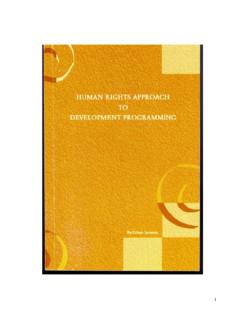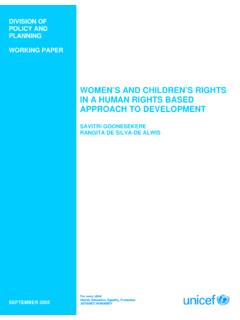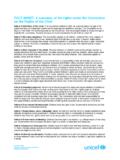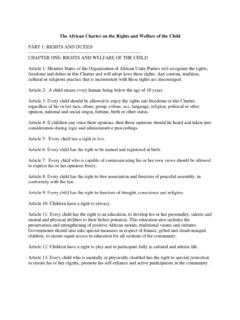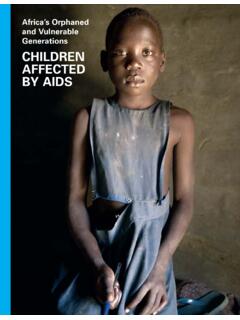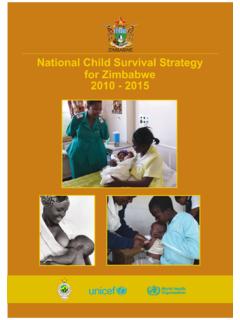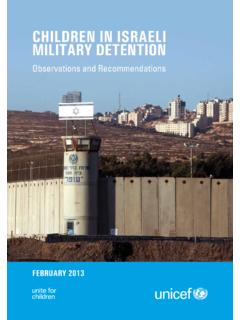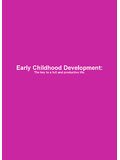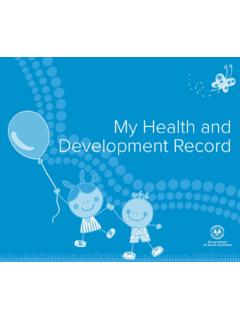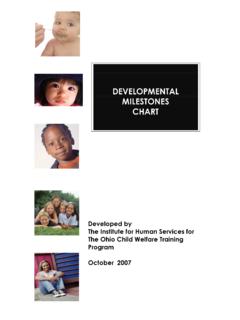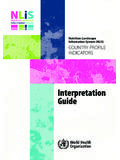Transcription of Child-centred Development - UNICEF
1 Child-centred Development :The basis for sustainable human Development and progress of nations encompasses much more than economic growth. People are the most important resource of a country and the basis for its progress and Development . Human well-being and dignity is both the central purpose of Development as well as of the primary means towards Development . Sustainable human Development is therefore based on enhancing people s well-being and creating conditions of equality that enable all people to realize their full approaches to Development represent an opportunity to tackle seemingly intractable problems of poverty. Children are the starting point for breaking intergenerational cycles of denial and patterns of discrimination.
2 Promoting Development that is guided by the best interests of the child and oriented towards realizing the rights of children ensures sustainable human Development . The well-being of children translates into the well being of a nation. It is a key yardstick for measuring national development2. The Millennium Declaration was adopted by the United Nations General Assembly in September It was the outcome of the largest ever gathering of world leaders and represents the widespread endorsement of child -centered values and sustainable human Development . Donors such as the World Bank, the International Monetary Fund, the members of the Development Assistance Committee of the Organisation for Economic Co-operation and Development (OECD), and many other agencies have realigned their international Development goals to support this declaration.
3 As leaders we have a duty, therefore, to all the world's people, especially the most vulnerable and, in particular, the children of the world, to whom the future Secretary General Kofi Annan (at the Millennium Summit)Why a child -Centered Approach?Children are the building blocks of nations and all of humanity. The effects of poverty and lack of Development are the most extreme on children, causing lifelong damage in their minds and bodies. It restricts their human capabilities as well as their life opportunities. Damage suffered due to malnutrition, ill health and inadequate care during childhood impedes future learning and physical Development that often cannot be repaired later in life.
4 Children living in poverty then pass that poverty along to their children and perpetuate the cycle. The cycle of poverty has a negative impact on all stages of children s lives. Even before they are born, the impact of anaemia in pregnant women frequently results in low birth weight babies. Inadequate care and nutrition, combined with unsanitary environments result in disease patterns of diarrhoea, respiratory infections and other preventable illnesses that often kill children under-five years of age. For those who survive, these conditions undermine their physical, psychosocial and cognitive capacities. Early childhood is a critical formative stage for children.
5 Inadequacies of care, stimulation, adequate nutrition and a clean and healthy environment can result in limited cognitive Development and compromised immunity. Denial or neglect during this stage can restrict a child s learning potential, as well as increase their vulnerability to disease and infection. In 1998, 40 percent of children under five years of age in developing countries suffered from stunting (low height for age) and a significant portion from wasting (low weight for age).4 This indicates that children are not being adequately nourished, stimulated or kept free from infection and disease. Child-centred Development1 The worst manifestations of poverty and lack of Development can be eradicated in less than a generation.
6 Taking a child -centered approach is essential to breaking these cycles of denial that restrict children s capabilities and potential. It is the only way to address patterns of ill health, inadequate nutrition and the limitations of poor or no education. It is the foundation for all nation patterns of denial continue to middle childhood. This is the stage where access to quality basic services plays a crucial role in children s Development . Basic education in particular underpins the Development of human potential and life opportunities for children. Yet in 1999, at least a 130 million children of school going age in the developing world did not have access to education and a substantial portion of those who did go to school were captive to sub-standard situations where little learning actually takes In many countries, as a coping strategy to deal with poverty, children are frequently forced to work, taking care of their younger siblings, or labouring inside or outside the home, instead of attending school.
7 In 1998, globally 250 million children were All too often, children, particularly girls, grow to adolescence bearing similar responsibilities to adults. Their lives have been characterized by denials of adequate nutrition, health care, a clean environment, emotional attention and education. This is also an important time of socialization where traditional gender roles and identities are reinforced. The subordinate status of women to men perpetuates cycles of denial. Indeed women s ill health and inadequate nutrition during pregnancy, and insufficient obstetric care frequently result in low birth weight babies that are particularly vulnerable to sub-optimal early childhood Development .
8 All this implies that children bear a disproportionate burden of poverty and a denial of their rights. No other age group is more likely to live in poverty. A child born today in the developing world has a 4 out of 10 chance of living in extreme Child-centred Development32 Global Commitment to Children The Convention on the Rights of the child (CRC) was adopted in 1989 and was ratified more quickly and by more countries than any previous human rights The ratification of CRC by all but two nations of the world represented a global recognition that children are not only entitled to human rights, but the pursuit and progressive realization of human rights should be guided by the best interests of the child .
9 The four foundation principles underpinning the CRC are: Universality/Non-discrimination (article 2) - All children have the same right to develop their potential regardless of their race, colour, gender language, opinion, origin disability or any other characteristic. The best interests of the child (article 3) should be the primary consideration in all actions and decisions affecting children. It serves as a mediating principle in situations where there are conflicts of interests and rights to ensure that children s best interests prevail. This principle provides a basis for evaluating protection towards children.
10 The best interests principle has been invoked to argue that basic services for children and women must be protected at all times, including during wars, periods of structural adjustment and other economic reforms. Right to Survival and Development (article 6) - Access to basic services and equity of opportunity to achieve their full Development should be ensured to every child . This should be based on distributive justice and positive policies to guarantee opportunity and access to all. Views of the child (article 12) should be given regard and respected. Children s opinions and participation in decision-making are central to the realization of their Convention on the Elimination on All Forms of Discrimination against Women (CEDAW) is an important human rights instrument because through it the well-being of children is linked to the biological and social status of women.
